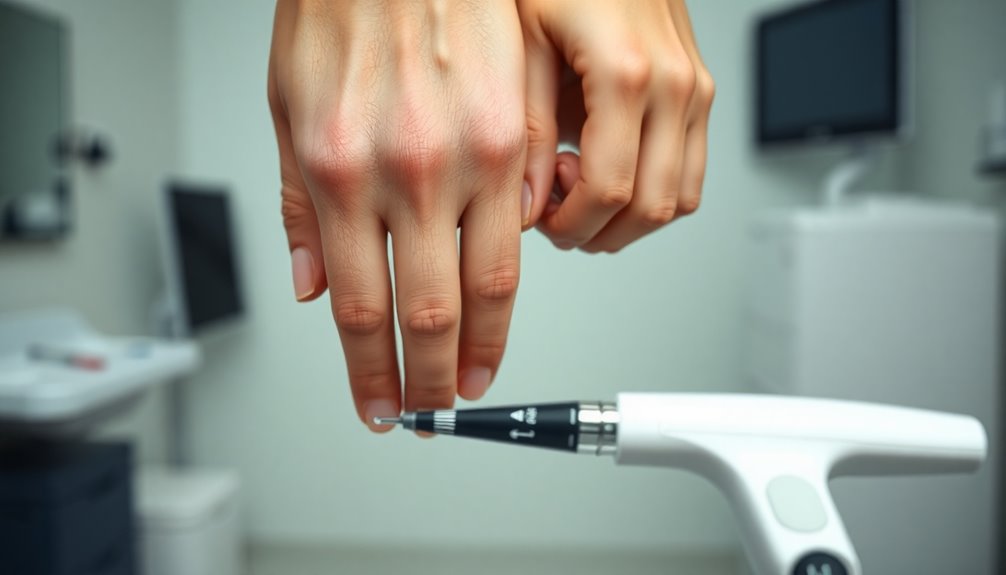If you're feeling a burning sensation during sex, it could stem from several factors. Inadequate lubrication is often a major culprit, usually caused by hormonal changes, lack of arousal, or insufficient foreplay. Infections, like yeast infections or bacterial vaginosis, may also lead to discomfort. Allergies to latex or certain lubricants can cause irritation as well. Emotional factors play a role too, potentially impacting your arousal levels. It's essential to address this issue, as ignoring it can lead to more serious problems. There's so much more to understand about this, so keeping on can offer valuable insights.
Key Takeaways
- Burning sensations during sex may result from inadequate lubrication, often due to hormonal changes or insufficient arousal and foreplay.
- Infections such as yeast infections or bacterial vaginosis can cause discomfort and burning sensations during intercourse.
- Allergies to latex condoms or certain lubricants can lead to burning sensations during sexual activity.
- Emotional factors, including anxiety or stress, can hinder arousal and lubrication, contributing to discomfort during sex.
- Persistent burning during sex warrants professional evaluation to identify underlying health issues and prevent chronic pain.
Overview of Burning Sensations

Burning sensations during sex can be unsettling, especially when they disrupt what should be an enjoyable experience. Nearly 75% of vulva owners experience this discomfort, which can range from mild irritation to intense pain, sometimes lingering even after intercourse.
You might notice that a burning sensation during sex could stem from several factors, including vaginal infections like yeast infections or STIs. A lack of arousal or hormonal changes, particularly during menopause, can also play a role.
Ignoring these issues can lead to painful sex, ongoing discomfort, and emotional distress, making it essential to seek medical advice. Addressing these concerns early can help restore your sexual well-being and enhance your intimacy.
Common Causes of Discomfort

If you're experiencing discomfort during sex, several common causes might be at play.
Insufficient lubrication, hormonal changes, and infections or allergies can all lead to that burning sensation.
Understanding these factors can help you address the issue and improve your sexual experience.
Inadequate Lubrication Issues
Inadequate lubrication is one of the most common culprits behind discomfort during sex. When there's not enough moisture, friction increases, leading to burning during sex.
You might experience:
- Vaginal dryness after certain medications
- Lack of arousal from emotional factors
- Insufficient foreplay before intercourse
- Hormonal changes affecting natural lubrication
- Increased pain during intercourse
These factors can all contribute to inadequate lubrication, making intimacy painful.
To alleviate discomfort, consider using water-based lubricants. They can provide the necessary moisture, ensuring a smoother experience and reducing the risk of burning sensations.
Hormonal Changes Effects
Hormonal changes can considerably impact your sexual experience, often leading to discomfort and burning sensations during intercourse. A decrease in estrogen levels, particularly during menopause or perimenopause, can result in vaginal dryness, increasing friction and discomfort during sex.
If you're using hormonal birth control, it might alter your natural lubrication, contributing to that burning feeling. Postpartum hormonal shifts can also affect moisture levels, making sex uncomfortable.
Additionally, conditions like polycystic ovary syndrome (PCOS) can cause imbalances that lead to dryness. Lack of arousal can further exacerbate discomfort, highlighting the importance of addressing these hormonal factors for a more pleasurable sexual experience. Comprehensive hearing evaluations can also help identify if any underlying conditions contribute to your symptoms.
Consider discussing your symptoms with a healthcare provider for tailored solutions.
Infections and Allergies
Even when hormonal changes are managed, other factors can still lead to discomfort during sex. Infections and allergies are common culprits, causing a burning sensation that can ruin intimacy.
You might notice symptoms like:
- Abnormal discharge
- Itching or irritation
- Increased sensitivity
- Pain during penetration
- Discomfort after sexual activity
Infections such as yeast infections or bacterial vaginosis can cause inflammation, while allergic reactions to latex condoms, spermicides, or lubricants can irritate the vaginal area.
If you find yourself experiencing recurrent discomfort, it's important to consult a healthcare professional. Addressing these underlying issues can help restore vaginal lubrication and enhance your sexual experience.
Early diagnosis and treatment are vital to avoid chronic discomfort and guarantee a fulfilling sexual activity.
Specific Medical Conditions

When certain medical conditions are at play, you might experience burning sensations during sex, which can be both distressing and frustrating. Here are some conditions that can contribute to this issue:
| Condition | Description |
|---|---|
| Vaginismus | Involuntary muscle contractions causing pain. |
| Vestibulodynia | Burning pain at the vaginal opening during sex. |
| Interstitial Cystitis | Bladder pressure and pelvic pain leading to discomfort. |
| Vulvodynia | Persistent vulvar pain affecting sexual health. |
| Endometriosis/Pelvic Inflammatory Disease | Deep pain during sex due to inflammation. |
Understanding these conditions can help you seek appropriate treatment and improve your sexual experiences. If you suspect any of these issues, consult a healthcare professional for guidance.
Hormonal Influences on Pain

Changes in hormone levels can greatly affect your sexual experience, especially when it comes to pain and discomfort. Hormonal fluctuations can lead to issues like:
- Vaginal dryness that heightens friction
- A burning sensation during intercourse
- Decreased estrogen levels, often seen during menopause
- Vaginal atrophy, which causes thinning and inflammation
- Discomfort linked to hormonal contraceptives
These hormonal changes can considerably impact your body's natural lubrication.
For instance, during the luteal phase of your menstrual cycle, you might notice lower moisture levels. Conditions like polycystic ovary syndrome (PCOS) can also disrupt your hormonal balance, leading to vaginal irritation.
Recognizing these influences can help you understand why sex may sometimes be painful.
Importance of Seeking Help

Ignoring persistent burning during sex can lead to more serious health issues and emotional distress.
It's essential to communicate openly with your partner about what you're experiencing and seek professional help for a proper diagnosis.
Addressing these concerns early can greatly improve your sexual health and overall well-being. Engagement in physical activities can also be beneficial for managing stress related to sexual health issues.
Health Consequences of Ignoring
Experiencing persistent burning sensations during sex shouldn't be brushed aside, as neglecting these symptoms can lead to significant health consequences.
By ignoring the issue, you risk:
- Long-term physical discomfort
- Worsening of underlying medical conditions, like infections
- Increased pain and anxiety, making sexual activity less enjoyable
- Deterioration of emotional well-being, leading to stress
- Strained relationships due to avoidance of intimacy
It's vital to consult a health care professional to address these concerns.
Remember, approximately 3 out of 4 vulva owners face pain during intercourse, showing discomfort isn't normal.
Seeking help promptly can improve your sexual health and overall quality of life.
Don't let fear of the unknown hold you back from finding relief and reclaiming your pleasure.
Communication With Partners
Addressing discomfort during sex isn't just about seeking medical help; it also involves sharing your feelings with your partner.
Open communication about the painful burning sensation you experience is essential for fostering understanding and support. When you discuss these issues, your partner can become more empathetic and take a collaborative approach to your sexual health.
This honest dialogue can strengthen your relationship, promoting trust and reducing feelings of isolation. By engaging in these conversations, you empower each other to advocate for your needs and seek appropriate medical evaluation together.
Additionally, establishing healthy boundaries around your sexual experiences can create a more comfortable environment for both partners.
Ultimately, involving your partner in discussions about sexual health enhances mutual understanding and encourages shared responsibility for both your well-being, paving the way for improved intimacy.
Professional Diagnosis Necessity
When persistent burning during sex occurs, seeking professional help is crucial to uncover any underlying health issues. This discomfort could signal infections or conditions that need medical attention.
A healthcare provider will perform a thorough evaluation, which may include:
- A detailed medical history review
- A physical examination for vaginal irritation
- Diagnostic tests like swabs for infections
- Blood tests to check hormonal levels
- Tailored treatment plans based on findings
Addressing these issues early can prevent complications and enhance your overall health. Ignoring the symptoms might lead to chronic pain and emotional distress, affecting your relationships.
Open communication with your provider about your sexual health concerns is essential for improving your comfort and quality of life. Don't hesitate to seek help!
Diagnosis and Treatment Options

Burning sensations during sex can stem from various underlying issues, making a thorough clinical evaluation vital.
Your healthcare provider will likely start with a detailed medical history and a physical examination to identify the cause of your discomfort.
Diagnostic tests, such as swabs for infections, blood tests for hormonal imbalances, and urine tests, may be necessary to rule out conditions like interstitial cystitis.
Treatment options depend on the diagnosis; they could include prescription medications, over-the-counter lubricants, or hormone therapy.
Additionally, physical therapy and pelvic floor therapy can effectively address issues like vaginismus and vestibulodynia, focusing on muscle tension and discomfort.
Early intervention and accurate diagnosis are essential for improving your sexual health and overall quality of life.
Prevention Strategies

To enhance your sexual health and prevent discomfort, adopting proactive strategies is key. Here are some effective prevention strategies to reflect upon:
- Schedule regular gynecological check-ups to catch issues early.
- Practice safe sex using condoms to lower the risk of infections.
- Maintain proper hygiene with gentle products that support vaginal health.
- Stay hydrated and consume phytoestrogens to boost lubrication.
- Educate yourself on the safe use of sexual products to avoid allergic reactions.
Supporting Your Sexual Health

Supporting your sexual health is essential for enjoying a fulfilling and pain-free intimate life. If you experience pain during sex, like burning sensations, don't ignore it. It could signal underlying issues such as infections or hormonal changes that need medical attention.
Persistent discomfort can stem from vaginismus or vestibulodynia, so seeking timely professional help is essential.
Using water-based lubricants or natural oils can greatly reduce friction and alleviate vaginal dryness, especially during hormonal fluctuations like menopause.
Regular gynecological check-ups help in detecting and managing sexual health concerns early on.
Frequently Asked Questions
Why Does Sex Cause a Burning Sensation?
A burning sensation during sex can stem from several factors.
You might experience it due to inadequate lubrication, which leads to friction and discomfort.
Hormonal changes can also contribute to vaginal dryness, making intercourse painful.
Additionally, infections, allergic reactions to products, or certain medical conditions could be the culprits.
Paying attention to your body's signals and consulting a healthcare professional can help identify the cause and find relief.
How Do You Get Rid of a Burning Sensation During Sex?
To get rid of a burning sensation during sex, start by using a water-based lubricant to reduce friction.
If discomfort persists, consider consulting a healthcare provider to rule out infections like yeast infections or bacterial vaginosis.
You might also explore hormonal treatments, such as vaginal estrogen, especially if you're experiencing hormonal changes.
Engaging in pelvic floor therapy and practicing relaxation techniques can also help ease tension and improve your experience.
Is It Normal for Sex to Burn a Little?
Is it normal for sex to burn a little?
Well, if you think discomfort's just part of the package, think again!
While some mild sensations can happen, a burning feeling isn't something you should brush off.
It often signals underlying issues like dryness, infections, or sensitivities.
You deserve to enjoy intimacy without pain, so don't hesitate to consult a healthcare professional.
Addressing this can lead to a much more pleasurable experience.
How Do I Stop the Burning Down There?
To stop the burning down there, start by using water-based lubricants to reduce friction.
You should also consider scheduling a consultation with a healthcare provider to check for any underlying issues.
Engaging in extended foreplay can enhance natural lubrication, making things more comfortable.
Additionally, try over-the-counter vaginal moisturizers or prescription options if dryness is an issue.
Practicing good hygiene and avoiding irritants will also help maintain your vaginal health.
Conclusion
In summary, if you experience a burning sensation during sex, it's essential to pay attention to your body's signals. Like a warning light on your dashboard, discomfort can indicate an underlying issue that deserves your attention. Don't hesitate to seek help; there are effective diagnosis and treatment options available. By taking proactive steps, you can enhance your sexual health and enjoy a more fulfilling experience. Remember, your comfort and well-being should always come first.









